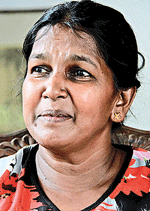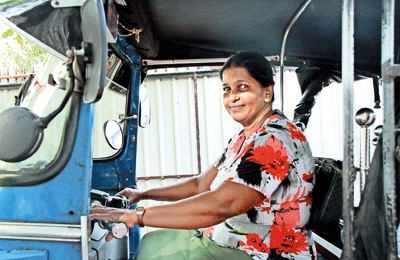It’s not Superwoman, just Indani on a tuk-tuk
View(s):
Indani Gunasinghe
She cooks all three meals for her family and takes care of the daily chores. She is also the breadwinner. Is this Superwoman, or a fairy godmother whose wave of the wand makes good things happen in a jiffy?
No, it is only Indani Gunasinghe, a 53-year-old grandmother, who drives a tuk-tuk to earn a living. We were seduced by her story – the timeless Mars versus Venus metaphor – and felt it deserved the ink on these pages even though she is not a top-notch business leader. Sometimes down-to-earth common-folk can get the message across louder and better.
And she has plenty of words of wisdom that even Solomon himself would have found it hard to keep up. One priceless gem embedded in hard logic is that there are too many three-wheelers in this country and it would be better if men stuck to the soil.
“More and more young men are coming out of the villages and becoming three-wheeler drivers. They are trying to become rich quickly and think by doing this they can achieve their dreams. They think wearing a ‘clean suit’ can help them. Sadly it is not the case. It is a tough life driving a tuk-tuk,’ says Indani.
My Sinhala is bad and her message has to be translated. Asha, my cousin is more than adept in the vernacular and nothing is lost in translation and Indani’s message rings a strident bell.
Economists in the country rue the state of our plantation sector. One reason is the lack of a willing workforce. With the farmer leaving the paddy field in search of streets paved with gold in the city, it is no surprise that these sectors are facing serious issues.
Farming family

Indani's prized possession.Pix by Indika Handuwala
Indani talks through experience too. Her dad used to be a farmer knee deep in mud ploughing fields in Agalawatte in the Kalutara district. Thankfully he did not throw down his thresher for a touch phone as most of the younger menfolk are doing these days, queueing up to join the ever-growing ranks of tuk-tuk drivers on call.
“It would be better if the men left it to us women to drive the three-wheelers. Not only would it be better for the country as a whole, but we women are also better drivers,” she says. It is a barb that pierces, but anyone who has experienced the maniacal driving of these kamikaze pilots will find more than a few grains of truth in it.
The youngest of six children, one boy and five girls, Indani learned from a very young age to be enterprising and street smart.
“We helped our dad in the field and also a small hotel (café/restaurant) that he owned,” recounts the Attidiya town
(near Ratmalana)grandmother. “It was a tough life but he gave us everything. I remember while other children in class didn’t have shoes I always wore a pair.”
That grounding has helped her guide her family through hard times and is a lesson on leadership which would make any corporate bigwig swell with pride.
Her troubles began around 20 years ago when her husband began suffering from paralysis. The muscles in his leg started to waste. He needed help for the simplest of personal tasks. She had to wait on him. Most wives would have been in despair but not Superwoman.
Indani rose to the challenge. She and her husband used to sell dry-fish as well as have a clothing business – selling garments on the pavement outside the Ratmalana market – but with his illness, she was forced to close the shops.
String hoppers
And instead she started her own business from home – making stringhoppers. She had two big clients in Bodyline and Unilever for whom she had to deliver the morning breakfast three days a week.
“Bodyline ordered 20,000 stringhoppers two days a week while Unilever took 10,000 once a week. This kept my family going. I hired five men to work for me and by selling stringhoppers, we managed to get our lives back in order financially,” she relates.
 It was tough going. A van they owned was taken back by the bank after lease payments could not be met. She had to buy a three-wheeler to deliver her goodies.
It was tough going. A van they owned was taken back by the bank after lease payments could not be met. She had to buy a three-wheeler to deliver her goodies.
“It was around 1998 that I bought my first three-wheeler and I decided I would drive it. I used to ride a push cycle and I felt confident about driving a tuk-tuk.”
It was the height of the ethnic problems in the country. But Indani had no qualms about making deliveries early in the morning to meet her breakfast commitments – unlike other CEOs, she was taking the breakfast to her clients.
It was while returning after her deliveries, that Indani had the brainwave to make a strategic shift in her corporate policy. Why not put her time – the rest of the day- to good use by taking on hires. So she fixed a meter to her tuk-tuk and started looking for passengers.
“At the time, around 1999, I believe I was one of the few women three-wheeler drivers. Today there are a number of us, but at that time very few women drove tuk-tuks.”
“I have found out that being a woman driver is no problem. In fact sometimes it helps as some people prefer a woman driver to a man. But I had to use my judgement as to who to pick up. I wouldn’t stop for every man who flagged me down and I would have to decide instantly if it was safe for me to take the hire.”
The twin incomes from supplying stringhoppers and earning fares gave her financial freedom. Her husband, meanwhile, got better and that was another bonus.
But the business (stringhoppers) couldn’t be sustained simply because she found it difficult to find the help as well as to house the workers at home. With such a large quantity of stringhoppers on order, work had to start around 3am in the morning. As such the hired help had to be put up at home. But a dearth in workers – most probably they too had decided to become tuk-tuk drivers – forced another change in corporate strategy after almost 10 years.
“I decided to stop supplying stringhoppers and focused just on my three-wheeler business as well as my other transport services,” she reveals.
By now she had bought a bus – driven by one of her sons on the 162 route from Bandaragama to Colombo – as well as a van and a second three-wheeler. Things were looking up and she had a set clientele of a dozen or so regulars to keep her busy on the road in her green tuk-tuk with the registration number YH 2649.
While other corporate heads have hobbies like collecting art or cars, Indani does not have much time to spare for she knows if she gives in to such pursuits it will cost her financially. But she still finds time to indulge – visiting temples as well as participating in Kiri Daneys, a religious ritual where the participant does not eat fish or meat for days.
Perhaps it is her diet – always red rice, kola kande etc – which has turned her into a real Superwoman for she reveals “I have never been sick in my life and I have never taken any medicine, not even a Panadol”.
Wow, I try to pry what elixir she partakes of. But apart from her reticence to eat any meats and bread (“I never touch bread”), she says it is hard work that keeps her strong.
“Not only do I work all day driving around but I also cook and do all the work at home. Hard work never hurts you. If a husband was to pay his wife a salary, he would have to pay her 10 times more than what he earns,” she laughs. We nod sagaciously when her words are translated.
Content with life
She is not only healthy (I touch wood, my head) but she is also content with life. This is simply because she knows when to draw a line and say it is enough. “I stop working every day around 7pm. I won’t take another hire unless it is from one of my regulars and it is an emergency. But I guess I’m lucky to be in this position. A lot of three-wheeler drivers are not as fortunate as me.”
This is because Indani owns her own tuk-tuk. If she had to hire one, she would have to pay the owner a minimum of Rs. 500 a day. On top of this petrol/diesel costs per day would come to around Rs.1,500 making it a tough sell for the driver would have to own a least Rs. 3,000 in hires daily to make it all worthwhile.
“This is why I can’t understand why more and more young men are leaving their villages and coming to the cities to drive a three-wheeler. They could make more money if they stayed at home and did what their fathers and grandfathers did,” advises Indani.
We can only agree as we try to avoid another wretched three-wheeler driver (a male one) on the road.


